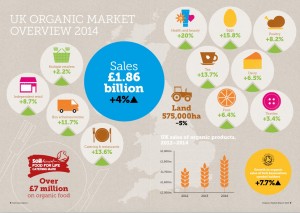Sales of organic products rose by 4% in 2014 confirming the UK organic market’s growth trajectory.
Figures published today in the Soil Association Organic Market Report 2015 show that shoppers spent an extra £1.4 million a week on organic products taking the total organic market to £1.86 billion, bringing sales back to levels in 2009.
Independent retailers – where organic sales were up 5.7% – and organic box schemes (up 11.7%) continue to spearhead the return to growth. Sales of organic at larger specialist retailers like Planet Organic, Whole Foods Market and As Nature Intended were better still, up around 10% on 2013 figures.
Strikingly, the steady growth of organic sales seen over the last three years is set against a downward trend in food prices (-1.9%) and food spending (-1.1%).
 Welcoming the report’s findings, the Soil Association’s chief executive, Helen Browning, said: “Three years ago, commentators were writing off the organic market in the UK. Now, with a third year of steady growth, and against a falling overall food market, it’s clear that reports of organic food’s demise were premature to say the least. This reinvigoration may be partly related to an improving economy, but it’s also testament to the fact that retailers and manufacturers who continued to invest in organic lines have continued to thrive. Now, even the discounters are beginning to stock organic ranges.”
Welcoming the report’s findings, the Soil Association’s chief executive, Helen Browning, said: “Three years ago, commentators were writing off the organic market in the UK. Now, with a third year of steady growth, and against a falling overall food market, it’s clear that reports of organic food’s demise were premature to say the least. This reinvigoration may be partly related to an improving economy, but it’s also testament to the fact that retailers and manufacturers who continued to invest in organic lines have continued to thrive. Now, even the discounters are beginning to stock organic ranges.”
“Three years ago, commentators were writing off the organic market in the UK. Now, with a third year of steady growth, and against a falling overall food market, it’s clear that reports of organic food’s demise were premature to say the least”
Browning said that a high level of innovation was helping to drive growth. 2014 saw more organic versions of established brands, organic recipe boxes for busy occasion shoppers and wholesalers selling direct via mainstream online shopping outlets.
Crucially, organic is shown to be embracing innovation in a fast changing retail landscape – particularly in online and home delivery – with brands adding new and innovative products, and working creatively to customers interested in the sector.
The 2015 report seems to find many organic business in a confident frame of mind, with 63% predicting growth in 2015 and six out of ten of these (62%) anticipating double-digit growth.
There were standout performances in 2014 from the organic beauty and personal sector, up 20% (propelled in part by a dedicated Organic Beauty Week during last year’s Organic September), organic eggs, up 15.8%, fresh fruit, up 6.4%, and tea, up 13.7%.
There was also significant growth in organic supply into catering, (13.6%), reflecting dynamic growth of the Soil Association’s Food for Life Catering Mark in schools, workplaces and hospitals – the market exceeded £1 million a week for the first time and is now worth £55.8 million.
Despite the UK sector’s strong performance, organic markets in other leading EU countries continue to “grow faster – and some a lot faster”, said Browning. “This is happening notably where there is stronger policy support for organic”.
The Soil Association’s policy director, Peter Melchett, said there was still “a staggering difference in attitude” towards organic among policy makers in other parts of Europe. Browning said that a common feature of the highest performing organic markets in Europe was that organic was better embedded culturally and politically. “It’s seen as something normal and uncontroversial. That’s why ‘normalising’ organic is a big priority for us.”










